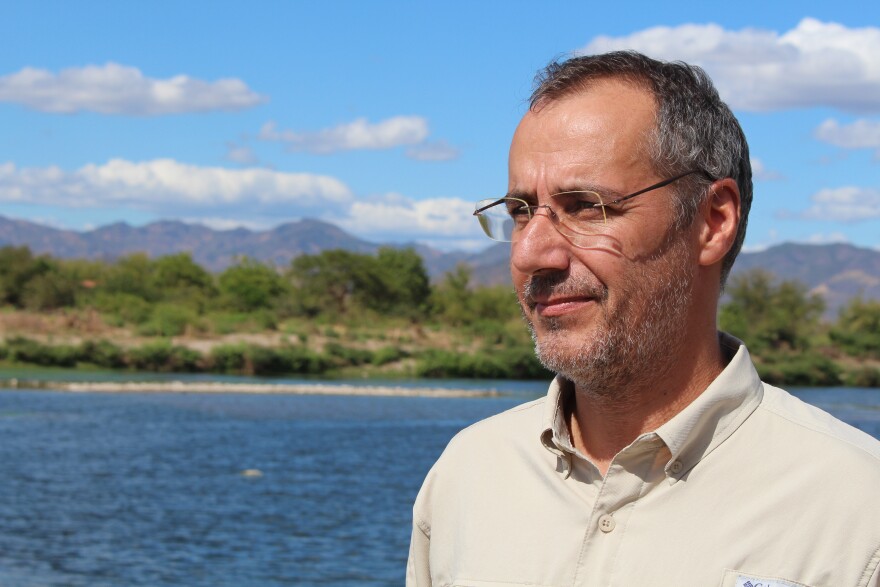Change can be difficult for people who have been practicing certain methods for generations, like farmers in Central America. UPR’s agriculture reporter Bronson Teichert traveled to Honduras to see how individuals are inspiring change in their communities to stay ahead of an evolving economic climate.

Before my trip to Honduras I imagined the central American country to be covered in lush green vegetation. High in the mountains, this was true, but as we drove down to lower elevations the landscape changed. The scenery looked more like I was on a safari in Africa. The grass was brown, bare trees dotted the flat landscape and - no water.
Jose Luis is an agriculture climate smart facilitator for International Development Enterprises, which is a non-governmental organization. He has been my guide and tells me that helping farmers in the upper watershed adopt new practices like drip irrigation and solar pumps is changing individual lives and local economies.
“All those techniques have been implemented in addition to good watershed management practice like conserving the trees and reforesting for soil conservation,” Jose Luis said.
Many people in the lower watershed have not made changes to improve their agricultural practices and Jose Luis said for some, it’s because they don’t want to change. He said the Honduran government, non-profits, non-governmental organizations and rotary clubs have been trying to help by just giving money to the farmers and not making lasting impacts.
Jose Luis said iDE is here to make lasting changes. He wants to help the people to help themselves. One of the biggest indicators that is going to happen?
Adoption of technology.
We met up with a group of commodity leaders in the local area. They had already started talking under a shade tree and a water pump in the background A few years ago, these farmers were finally tired of the water being mismanaged. So commodity leaders from industries in cattle, chickens, melons and okra decided to work together, get organized and implement new ideas.
Jose Carlos Ordono is the president of the okra producers association. He said the groups started a research project about a year ago to determine what areas need to be improved.
“The water is limited because we have six to seven months of drought,” Ordono said. “It’s very important to make good decisions when managing the water between human consumption, irrigation and animal consumption.”
Ordono said the group’s main objective is to save water, protect resources and to keep Hondurans working in Honduras. He said they also want to improve the living conditions of communities struggling with extreme poverty.
“Thanks to the water we can work, create incomes and opportunities for people,” Ordono said. “In this area the okra producers have created more than 500 jobs.”
Creating jobs in the fields is great, but what about the people in the cities who depend on the same water as the farmers? Sohrab Tawackoli is the coordinator of the program water governance in region 13 of Honduras. He said the Choluteca river in southwest Honduras is the main water source for farmers in rural areas and people in multiple cities.
“The inhabitants of Choluteca only have water in the pipeline for two days of the week,” Sohrab said. “The problem is not the availability of water, the problem is the management and administration of water.”
Sixty percent of the drinking water for the city of Choluteca comes from the Choluteca river according to Sohrab. The river comes from Tegucigalpa, the capital of Honduras and the largest city in the country.
“We have a lot of consumption of water for agriculture,” Sohrab said. “On the other side we have a lot of contamination due to the big cities, the capital and the waste water is drained to the rivers.”
Sohrab has a lot of work to do with cleaning up the river and building infrastructure to better manage the water. But he said most of his job right now, is getting everyone to work together because everyone has their own interests. So first, promote dialogue.
“The idea is to raise the water committees, have democratic structure, have representatives of different groups,” Sohrab said. “On different levels, representatives of different groups can express their problems.”
The city of Choluteca only has water in the pipes two days a week and while this part of Honduras has a hot and dry climate Sohrab said lack of water isn’t the problem.
“We have water here, the problem is the management and administration,” Sohrab said. “That is not done by corporations, foreigners or money coming in from the outside, that is a local problem and people have to deal with this problem. They have to make the proposals and it is ownership is what we are trying to promote.”
Sohrab is convinced this area has potential. He said this region already exports $50 million of melons to 40 different countries along with production of okra, sugarcane, animals and sea food.
“People must be aware that water is not infinitely available and water has got a cost,” Sohrab said. “With time we teach people that water has got a cost and we have to administrate this scarce resource which we have.”
There is a long road ahead for the farmers and the people living in the cities of southwest Honduras. But the will to make change happen by a few people like Jose Luis, Jose Carlos Ordono and Sohrab are what transforms countries and the lives of individual people.








